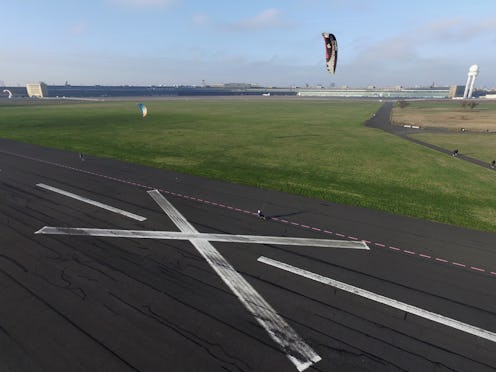News
The UK Plans Its Own In-Flight Electronics Ban

Early Tuesday, the world of commercial aviation was hit with an unexpected and controversial new restriction, with the official announcement that the Department of Homeland Security was implementing a ban on the in-cabin use of certain electronic devices on flights incoming from some countries in the Middle East. And one day later, it's been reported that aviation authorities in the United Kingdom are following suit ― the U.K. is banning electronics on flights from some Middle Eastern countries, although it won't be a perfect mirror of the new American restrictions.
The Trump administration policy bans travelers from possessing electronic devices bigger than cellphones in the cabin of planes of any of the following Middle East-based airlines, across 10 airports in the region: Emirates, Egypt Air, Kuwait Airways, Royal Jordanian, Turkish Airlines, Saudi Arabian Airlines, Royal Air Maroc, Qatar Airways, and Etihad Airways.
According to reports, the British government has confirmed the ban, which will affect six British airlines ― British Airways, Thomson, Easyjet, Thomas Cook, Monarch, and Jet2 ― on flights incoming to the U.K. from Lebanon, Egypt, Tunisia, Jordan, Saudi Arabia, and Turkey. Another eight foreign-based airlines will fall under the same restrictions.
Britain and America are close allies who coordinate tightly when it comes to intelligence, and according to the Telegraph, British agencies have seen the same information that led the United States to implement the new restrictions.
It's not surprising that the U.S. and U.K. would come down similarly on this, although the suddenness of the announcement relative to America startled a lot of people, reportedly leading to annoyance and confusion for travelers at affected airports and on affected airlines. There was no prior warning or indication by the Department of Homeland Security that this policy was in the works in recent weeks, and that's also been true of Britain. Although, according to the Telegraph, conversations about how to implement it have been kicking around in the halls of the British government for weeks.
While it's not clear what the purported threat is that serves as the ostensible justification for the ban, it's worth noting that Britain imposed a similar policy back in 2006, a move which reportedly led to a surge in baggage theft. If you know that anyone with a laptop or tablet has to check them rather than bring them in-cabin ― which is true of a huge number of people, whether traveling for person or professional purposes ― then checked baggage becomes an even more tantalizing target for theft, suffice it to say. Hopefully that's not a fate that befalls anyone in the early days of these new policies, but for what it's worth, your phone will still be able to be carried aboard.